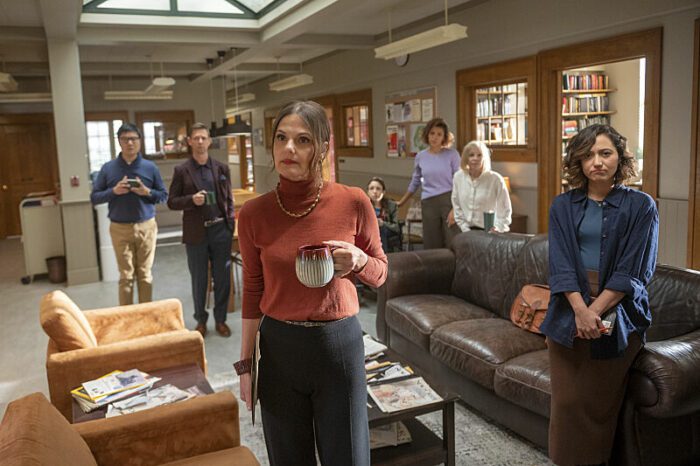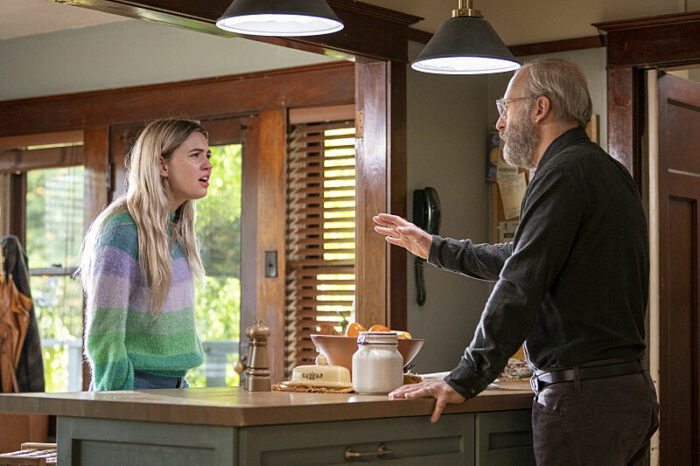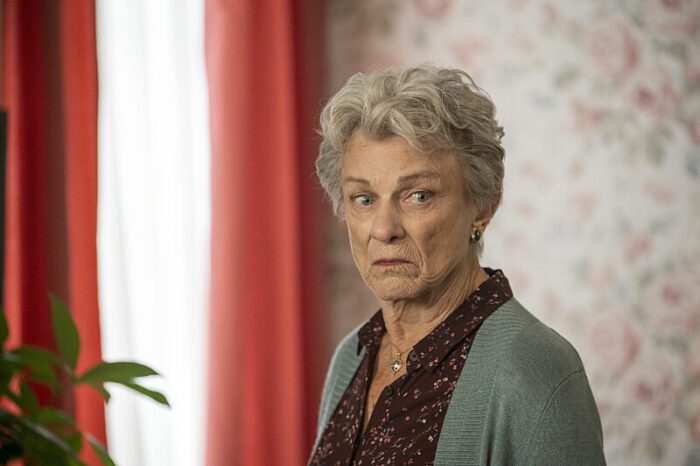The following recap contains spoilers for Lucky Hank S1E3, “Escape” (written by Adam Barr and directed by Dan Attias)
If you’ve made it through the first three episodes of Lucky Hank, you know by now that the primary setting for the show is in academia. Bob Odenkirk’s Hank Devereaux, Jr. is a department chair of the English faculty for Railton College, a stand-in for a whole bucketful of East Coast, left-leaning, liberal arts colleges that may or may not have survived or thrived in a post-pandemic world. Mireille Enos’s Lily Devereaux is a vice principal for an Everytown, USA high school that balances its fair share of chaos, apathy and underfunding.

Academia, especially higher education, can be an interesting backdrop for a dramedy like Lucky Hank because its very nature poses the question, “who exactly is running this ship?” Do universities exist to meet the demands and desires of their “consumers,” their students? But what do they know, they’re all still kids? Do they exist to serve their faculty who are often the “rock stars” of the institution? Many of them across higher education have mixed feelings about actually teaching, about research, about publishing, and certainly about fundraising. But does it even matter for those on the tenure-track, because you can’t do anything about them anyway? Do universities exist to be led by administration, the (mostly former) academics who hold all the “power” of decision-making but truly need buy-in from the other two groups if they want to enact anything that works?
A number of shows have tried to depict all of this with varying levels of success. Some shows like Community and Undeclared have done it with piercing satire or humor. Others like The Chair or Dear White People use the tools of drama or social commentary to fuel the story. But it’s a fertile ground of dysfunction and discouragement.
The triangular struggle for power, expectations, and hierarchy in higher education can also be quite the delivery method for the type of conflict and self-destruction we have seen through three episodes of Lucky Hank. Episode 3, “Escape,” sees Hank face-to-face with several people in his life dealing with the one thing he wants but can’t have: escape. Railton College and the town they live in offer Hank tenure and the unrivaled security amidst all the dynamics of their careers and personal lives. But that safety in tenure is also his shackles.

Seemingly everyone in his life has an opportunity for some kind of reprieve from the Railton life. His daughter, Julie, thinks she is in over her head with some home projects and career choices. Hank’s solution: you’re young, you can move away. Lily’s struggle with a union-backed janitor and boss who won’t clean up urine in the school hallway forces her to reconsider the private school job available in New York. Hank reluctantly tells her to go for it.
Budget cuts at the school are requiring that all department chairs make secret lists of which faculty should be cut if the administration is forced to make tough choices. Even though Hank is asked to keep this under wraps, he has no problem divulging that information to his department, confirming the rumors they are all hearing. In his mind, for some of them, it could be an escape. The budget cuts mean no new opportunities for adjunct professors and also mean a hiring freeze is in place. Hank’s bartender/confidant/wanna-be professor, Meg Quigley, has been begging Hank for a reference so she can join the faculty at Railton, so he uses the financial turmoil as a manipulative motive to try and convince her to escape, so as not to end up as he did.

But most devastating to Hank is the discovery that his mother, his lifelong partner against his absentee father, reconnected with William Henry Devereaux, Sr. some years ago, and they have been trading letters and critiques of each other’s work behind Hank’s back. The one person who was no-questions-asked in his corner for decades escaped from the grief Hank’s father caused and had been hiding it from her son for some time. Even those closest to him who live in Railton have found a way or are seeking a way to move on and escape, but Hank’s hands are tied.
Hank wants to confront her about this, but ironically can’t escape his own house because his father shipped all his office belongings to Hank’s house, and the hulking crate was dropped off right in front of Hank’s garage. Just as the tenure will forever keep him tied to Railton College, his father metaphorically, and now literally, won’t let him escape where he lives. This shipping crate ends up being the MacGuffin of the episode as the thing that simultaneously won’t let him escape and also makes him want to leave even more. With his father’s belongings now in Railton, it means the man can’t be far behind. But the tenure that is thought to provide ultimate safety through budget cuts, hiring freezes, and outbursts in front of his students now chains him to a place he thinks everyone else should leave.

Lily sees this struggle (and learns Hank lied to Meg about the possibility of jobs at Railton) and shoves it back in his face. “You’re projecting your shit onto everyone else, telling everybody they should leave town. What is that? You can’t treat people that way.” The only alternative for Hank, then, is that he looks internally and projects all this shit onto himself. And he certainly doesn’t want to do that.
When Lily asks Hank if he hates where they live and he responds, “I plead the fifth,” it perfectly encapsulates the type of man Hank’s Patagonia-wearing, all-talk-no-action son-in-law said he was when he was interviewing for a job with Meg early in the episode. “The guy can’t make a decision. He gets paralyzed by his own brain. He acts like such a little boy sometimes.”
That leads to what is quickly becoming the fundamental conundrum of this series: Are we rooting for Hank? What do we want for him? These are big questions showrunners Paul Lieberstein and Aaron Zelman likely want us to be asking ourselves. Is the man who has either been given or achieved everything he could ever want that would bring him security always going to be miserable? Do we want him to find happiness?
Personally, I am rooting for the happiness and success of several other characters more than I am rooting for Hank to have a mid-life awakening. But at least in “Escape,” that’s what Hank is rooting for as well. He can’t detach himself from his abandonment issues, his job, or his grumpiness (“I realized I was getting too happy,” he tells Dean Rose after the events of Episode 2), but at least does not want others to end up like him.
Hank has a huge, immovable crate sitting in front of his house as this episode ends that doesn’t allow him to escape. But it sounds like that is just the way he likes it.


I’ve seen this atmosphere in action, worked in it as a grad student and been told by more than a few profs that they are experiencing anomie, boredom and massive regret about their choice to teach college. For a student, especially an undergrad who admires certain teachers, this is a rude awakening to the disappointments life holds. I recall looking at one of my favorite professor’s notes and was shocked to see that they looked as ancient as the Dead Sea Scrolls! He had been delivering the same lecture for years. Add to that his hysteria when students skipped his class, regarding it as proof that they didn’t like his teaching and that he was too old (at age 30). But when you get older, it can be a relief to sink into, if not mediocrity, then anti-social misanthropy and accepting the idea of not continuing to rise in your field. They capture this so well, especially Bob Odenkirk, that most people may find him depressing. I did at first but now see him as quietly rebellious and hilarious.